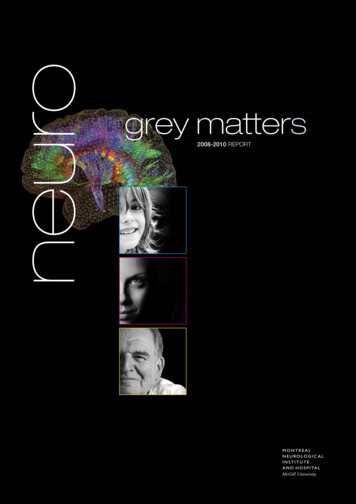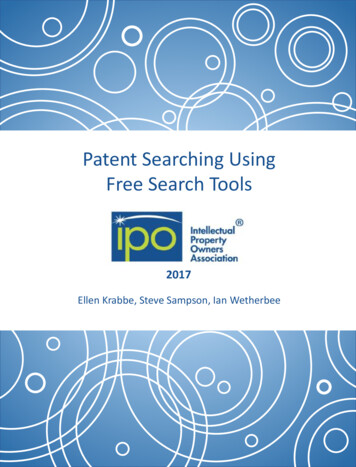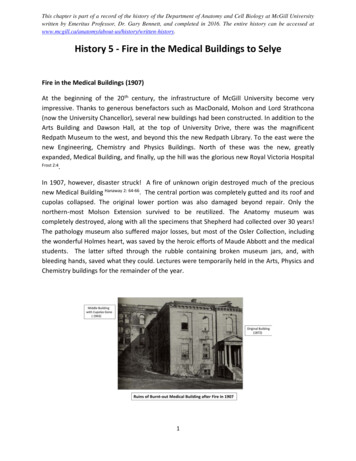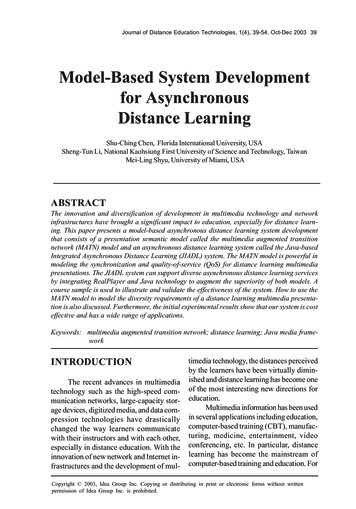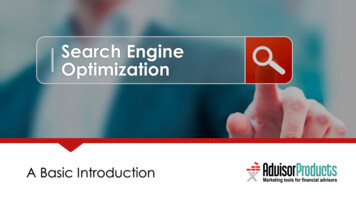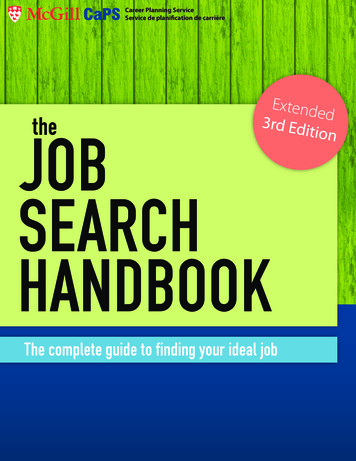
Transcription
Career Planning ServiceService de planification de carrièretheExtended3rd EditionJOBSEARCHHANDBOOKThe complete guide to finding your ideal job
PrefaceThe CaPS Job Search Handbook has been created by the McGill Career Planning Service (CaPS)to help you conduct an effective job search.The Handbook can be used in conjunction with the CaPS Job Finding Club, CaPS workshops,in individual advising sessions or independently. The following chapters cover the entire jobsearch process, from self-assessment to your first year on the job, and include important jobsearch strategies, useful tips and information, exercises, additional resources and samples ofC.V.’s and other job search tools.What is Inside the Handbook?In addition to an introduction to CaPS and our services, the Handbook also contains an introduction to how we think about careers, and the following chapters: Chapter 1: Self-AssessmentChapter 2: Explore Employers & OccupationsChapter 3: Find Job Opportunities Through NetworkingChapter 4: Write a C.V.Chapter 5: Write a Cover LetterChapter 6: Prepare for the InterviewChapter 7: Job Offers and Your First Year on the JobHow to Use the HandbookThe Handbook was primarily designed to be worked through in order, from self-assessment tointerviews to your first year on the job, but you can also “dip” into it and focus only on the specific areas you feel you need to work on. It is very user-friendly, with numerous exercises, tipsand resources to guide you through every step of the job search process.Enjoy the journey!Preface1
2Preface
Table of ContentsIntroduction - I. About CaPSOur Vision.5Our Mission.5Our Services.5Specialized Programs.7Contact Us.8Introduction - II. About CareersChapter 1 - Self-AssessmentValues.12Interests and Experiences.14Skills.17Achievements.22People Environment.24Working Conditions.26Summary: Ideal Job Profile.29Career Objective(s).30Resources on Self-Assessment.31Chapter 2 - Explore Employers & OccupationsThe World of Work.33Where to Find Information.35Get to Know Occupations, Industries and Employers.39Career Objective(s).44Additional Resources on Exploring Employers & Occupations.44Chapter 3 - Find Job Opportunities Through NetworkingUnderstand the Hidden Job Market.45Get Comfortable with Networking: Concrete Steps to Expand Your Network.46Find Job Opportunities Through Information Interviews.52Information Interview Stages.54Cold Calling and Telephone Etiquette.56Preparing Networking Tools.59Final Word: It’s all about building relationships!.61Resources on Networking.61Appendix - Sample Information Cards.62Chapter 4 - Write a C.V.Take an Inventory and Find a Suitable Employer.63Choose the Right Format.64Write Your C.V.65Customize Your C.V.72Resources on C.V. Writing.74Table of Contents3
Appendix - Sample: Untargeted C.V.75Appendix - Sample: Targeted C.V.77Appendix - Example: Targeted C.V. for Undergraduate Students.79Appendix - Example: Targeted C.V. for Student in Professional Program.81Appendix - Example: Targeted C.V. for Graduate Students.83Appendix - Action Verbs.85Chapter 5 - Write a Cover LetterElements of a Cover Letter.89Format and Proofread.91Send Your Letter and Follow Up.91Checklist.92Resources on Cover Letter Writing.93Appendix - Cover Letter Example A.94Appendix - Cover Letter Example B.95Appendix - Cover Letter Example C.96Chapter 6 - Prepare for the InterviewInterview Formats.97Know Yourself.98Know the Employer.98Prepare, Practice and Polish.99The Interview Day.106Follow Up.108Resources on Interviews.111Chapter 7 - Job Offers and Your First Year on the JobEvaluate the Offer.112Negotiate the Offer.114Your First Year on the Job: A Short Primer for Post-Graduation Workplace Success.115Resources on Job Offers and Workplace Success.117Appendix A7 Habits of Highly Effective People - Stephen Covey.118Appendix BNotes.1194Table of Contents
IntroductionI. About CaPSThe McGill Career Planning Service (CaPS) assists students in their career development andsearch for permanent, part-time, summer jobs and internships by providing workshops, individual advising, a comprehensive job posting service and an extensive Career Resource Centre.We serve all full-time students, including graduates, up to one year after the end of their studies. In addition to the downtown CaPS office, we have a second office at Macdonald campus inscenic Ste-Anne-de-Bellevue.Each year over 6,000 students and graduates look to us for assistance in their search for permanent, part-time and summer jobs and internships. We offer over 5,000 jobs and internshipopportunities to students annually.Our VisionOur vision is to see all McGill students fully engaged in their career exploration in a mannerthat enhances their student life experience; helps them to see the relevance of their educationto their career development; and enables them to achieve their career goals and make a positivecontribution to society.Our MissionOur mission is to inspire McGill students in the exploration of their career options and to increase their employability through the development of lifelong career management skills by:1. Creating an energized student-centred environment that makes career education accessibleto all;2. Leading the integration of career development and experiential education into McGill lifeand promoting their benefits to students;3. Delivering high quality career and job search programs, resources and events; and4. Developing a supportive network of McGill faculty and staff, as well as local, national, andinternational employers and alumni.Our ServicesIndividual Appointments and Mock InterviewsOur qualified and experienced Career Advisors are available to assist you in your career choices,help you stay motivated and focused in your job search, provide tips on preparing for an interview, and look over your C.V., cover letter or graduate school application. CaPS is here to makeyour job search and career planning less stressful.Career Development WorkshopsWorkshops are offered throughout the academic year on a wide range of topics, including Interviewing Techniques, C.V. Writing, Networking and Summer Jobs. They are designed to increaseyour employability and job search savvy. A complete schedule and detailed descriptions areavailable on our website.Introduction - About CaPS5
C.V. and Advising Drop-InDuring daily designated times, you can drop by the CaPS office to have your C.V. reviewed or toask a quick career-related question. Drop-In times are listed on our website.Career Resource CentreThe Resource Centre offers a wide array of print and electronic resources on career planning,job search, industry reports, scholarships, graduate programs and more. If you are not sure whatto look for, or are having trouble finding anything, do not hesitate to ask our Resource Librarian.The McGill Engineering Career Centre (MECC), the Management Career Centre, and the Macdonald Campus CaPS also have resource centres targeted to the programs they offer.CaPS Website (www.mcgill.ca/caps)Our website is the main gateway to services and information available at CaPS. It contains: A comprehensive overview of the job search processA listing of our services and programsInformation for students applying to graduate studies or professional schoolLinks to countless online resourcesUp-to-date announcements and eventsmyFuture (http://caps.myfuture.mcgill.ca)myFuture is CaPS’ job search and career tools suite. Using myFuture you can: Search hundreds of full-time, part-time and summer jobs/internshipsRegister for CaPS events and workshopsBrowse career resources such as employment periodicals and weekliesView announcements and alertsView employer profilesCareer FairsCareer Fairs are organized throughout the year in conjunction with student associations. Theyprovide excellent opportunities for you to meet company representatives from a variety of sectors. Check our website for information on current and upcoming fairs.On-Campus RecruitmentEvery year companies from Canada, the U.S. and abroad, visit McGill to recruit students directly. More information on campus recruitment can be found on our website under the “Servicesand Programs” section.Professionals on CampusA wide range of professionals come to campus to participate in panel discussions, special events,and career cafés, and to deliver company info sessions. These networking and informationevents are a great resource for exploring your career options and increasing your knowledge andcontacts in your field.6Introduction - About CaPS
Specialized ProgramsP.A.C.E. (Program for the Advancement of Career Exploration)Unsure what to do with your degree after you graduate? P.A.C.E. is an interactive four-workshop series designed to help you explore career options and preferences, personal goals, values,interests and skills, as well as develop job search strategies. Each workshop is around 2.5 hourslong, and the four workshops are spaced one week apart to allow time for vocational testingand occupational research. This program is a joint initiative of McGill Counselling Service andCaPS. Participants are required to pay a nominal fee to cover the cost of the vocational testing.Mentor ProgramHaving a hard time meeting professionals in your field? The McGill Mentor Program connectsstudents with working McGill alumni who can offer valuable advice about career alternatives,job requirements and career-life balance. To apply, please select your mentor by filling out theonline application at www.caps.mcgill.ca/ci2Peer Educator ProgramPeer Educators – student volunteers – promote CaPS’ services throughout campus by organizing outreach activities, and also help students during C.V. drop-in sessions. To get involved,please email caps.cpe@mcgill.ca.Job Finding ClubThis two-week program for newly-graduated students is designed to teach job seekers the mosteffective means of finding work in the field in which they want to be employed. The group ofaround 10-15 students have each other for support as well as the assistance of a facilitator andthe career advisors. The program is offered several times a year, usually during the spring andsummer.Introduction - About CaPS7
Contact UsCaPS has offices at the Downtown and Macdonald campuses: McGill Career Planning Service - Downtown CampusWilliam and Mary Brown Student Services Building3600 McTavish St., Suite 2200, Montreal, QC H3A 1Y2Telephone: (514) 398-3304; Fax: (514) 398-1831Email: careers.caps@mcgill.caWebsite: www.mcgill.ca/caps; myFuture https://csm-caps.mcgill.ca/Hours: Monday-Friday 9:00 a.m. to 5:00 p.m. McGill Career Planning Service - Macdonald CampusCentennial Centre - Student Service Centre21,111 Lakeshore Road Ste-Anne-de-Bellevue, QC H9X 3V9Telephone: (514) 398-7582; Fax: (514) 398-7610Email: caps@macdonald.mcgill.caWebsite: www.mcgill.ca/capsHours: Monday-Friday 9:00 a.m. to 4:30 p.m.Below are faculty-based career centres on campus, which offer career services to students fromthose faculties:8 Engineering Career CentreFrank Dawson Adams Building3450 University Street, Room 22, Montreal, QC, H3A 2A7Tel: (514) 398-8100; Fax: (514) 398-2169Email: careers4engineers@mcgill.caWebsite: www.mecc.mcgill.ca Management Career ServicesDesautels Faculty of Management1001 Sherbrooke Street West, Room 650, Montreal, QC, H3A 1G5Telephone: (514) 398-2996; Fax: (514) 398-2721Email: careercentre.mgmt@mcgill.caWebsite: http://www.mcgill.ca/desautels/career/ Faculty of Law Career Development OfficeNew Chancellor Day Hall3644 Peel Street, Rm 416 Montreal, QC, H3A 1W9Telephone: (514) 398-6159; Fax: (514) 398-2025Email: placement.law@mcgill.caWebsite: http://www.mcgill.ca/cdo/ Faculty of Medicine Career Planning Office3655 Sir William Osler Drive, Montreal, QC, Canada H3G 1Y6Telephone: (514) 398-5557; Fax: (514) 398-3595Email: careeradvisor.med@mcgill.caWebsite: ion - About CaPS
IntroductionII. About CareersPlanning your career is a little like planning for a backpacking adventure. Prior to your tripyou would want to consult relevant guidebooks and travel websites, talk to friends and acquaintances who have visited before and ask for recommendations, and find out about currentconditions in the areas you would like to visit. You would need to know about any visa or entryrequirements, obtain the dates of any must-see events, and if necessary, visit a travel medicalclinic prior to departure. You would search online and through travel agents for the best possible transportation and accommodation deals and book some of them before you leave. Whentravelling, advance research and preparation can go a long way towards an enjoyable and stressfree journey!But you would also likely spend a lot of time daydreaming and considering the possibilities forplaces to visit, and asking yourself what you want to get out of the trip, what is really importantto you. And once you are on your way you will likely revisit and subsequently change some ofyour preconceived plans as you meet fellow travelers, hear about new and interesting places tovisit and gain greater knowledge of the kinds of experiences that truly matter to you. Your tripmight turn out to be very similar to what you had in mind, or it could be vastly different, filledwith sights and experiences you would never have been able to imagine beforehand.It helps to think of your career as a journey, rather than a fixed destination. As with any journey, planning and researching is highly recommended: consulting career guides and websites,researching different occupations, talking with those who work in areas you are interested inand finding out about current labour market trends, job requirements and qualifications can allhelp you get a sense of your options and the parameters influencing your search.But while this advance planning, research and thought will definitely make the process muchsmoother, it is also important to recognize that from where you stand right now, as a universitystudent or recent grad, there is no way that you could possibly have all of the information youwill need along the way. That will come over time as you grow and develop as a person, experience new things, meet new people and further refine your sense of who you are, what you value,what you are good at and what you enjoy doing. At various points in your career path you willlikely stop to reflect on where you are going and what you want your next step to be. Careerplanning is a constant series of steps and decisions as you learn more about yourself and furtherrefine your direction. Your career may turn out to be exactly what you had expected, or you maywork in fields and occupations that do not even exist now!A few additional points to keep in mind: If you do not currently know what you want to do with your entire life, that is ok. It isactually more than ok, it is quite normal at this point. The key is to be actively involvedin your career journey, to think about and research possibilities, to try out different options and to learn about yourself in the process. Very few if any career decisions are irreversible; you can still change your mind alongthe way. If you make a decision that turns out not to be right for you, look at it as alearning experience, one more piece of information that will bring you closer to a jobthat better corresponds to who you are. Many people will have an opinion (solicited or not!) on your career direction, fromfamily, friends and partners, to professors, advisors and even this guide. Seeking out theguidance, expertise and support of others along the way can be extremely helpful andIntroduction - About Careers9
informative, but remember that you are the ultimate expert on yourself, and the responsibility for determining what you want and need out of a career, and the best path tofollow, ultimately rests with you. 10When considering career options, give yourself permission to dream a little! There isa whole wide wonderful world out there to be a part of and contribute to – time spentimagining all of the possibilities is well invested, as career decision-making is not asolely logical/rational process. Your heart, your spirit and your passion matter hugely. Ittakes a great deal of courage and strength to honour your dreams and listen to what youreally want out of your life and career. But why spend your time on anything else?Introduction - About Careers
Chapter 1Self-AssessmentStarting the job search and career planning process can sometimes feel overwhelming so it helpsto begin with the most important variable in the whole process – you!Self-assessment refers to self-awareness and self-knowledge, particularly regarding your personal and professional values, your interests, achievements, skills and personality. It is challengingto conduct an effective job search without a clear understanding of who you are and an ability toarticulate this knowledge to potential employers.Take the time to do a thorough self-assessment. You can start by asking yourself the followingquestions: What wakes you up? What makes you feel alive?What matters to you? What are you interested in?What are you good at? What are you proud of?What makes you tick? What roles currently define you?What would you regret not trying? What kind of life do you want to create for yourself?Even if you do not have all of the answers just yet, keep these questions in the back of your mindas you work through the self-assessment exercises in this chapter. These are designed to helpyou clarify and focus your self-knowledge as the first step to conducting an effective job search.“What do you want to be when you grow up?!”To get started with self-assessment, take a moment to reflect upon the different answers youhave had to this question over time. In the space below, quickly jot down all of the things youwanted to be “when you grew up,” from as far back as you can first remember, right up until thepresent day. (Yes, even those embarrassing and seemingly irrelevant ideas from your kindergarten and grade school years!) Some of you may list just a handful of titles; others may run out ofspace.What do you want to be when you grow up?Even if your list at first appears somewhat “random,” look more deeply and you will likely findsome common threads: values, themes and interests which have remained relatively consistentover time. Ask yourself if these still hold true for you today and keep them in mind as you complete the rest of the activities in this chapter.Chapter 1 - Self-Assessment11
ValuesValues are the fundamental, deeply held beliefs and ideas we consider important. They shapehow we view the world and what we consider right and wrong, good and bad. Some values aremaintained throughout our lives, while others may change and become more or less importantover time.We sometimes take our values so much for granted that we are not even aware of them and mayoverlook them during the job search process. However, finding a position that fits with yourvalues is absolutely intrinsic to your long term career satisfaction. Behaving in ways which areinconsistent with basic values may lead to frustration, disillusionment and even depression. Acrucial part of self-assessment, then, involves becoming aware of one’s values and seeking environments that are compatible with them.The seeds of our values are often developed fairly early in life and shaped by family, friends, culture, education, religion etc. When you do the following exercise, make sure to focus on thosevalues which are truly important to you, personally, not the ones which you think should beimportant to you or that others have told you should take priority.Workplace Values ExerciseThis is a 3 step exercise aimed at helping you to identify your workplace values. Be sure tobe honest with yourself as no one is judging, nor scoring, your results.Step 1Rate the degree of importance that you place on each of the following workplace values using this scale:1 Very important to me2 Reasonably important to me3 Somewhat important to me4 Not important to me at allI am interested in jobs and careers that include:Creating/building thingsMental challenge/mentally demanding/problem-solvingPhysical challenge/physically demandingOpportunity for balance between work life and family lifeFlexibility in work structureIntellectual status, an acknowledged “expert” in a given fieldOrder and structureHigh degree of competitionIntegrity and truthRewarding loyalty and dependabilityHaving self-respect and pride in workStability and securityStrong financial compensation and financial rewardsBeing recognized for quality of work in a visible/public way12Chapter 1 - Self-Assessment
Having a positive impact on others and societyUsing creativity, imagination; being innovativeVariety and a changing work paceProfessional development and on-going learning and growthFriendships and warm working relationshipsTeamwork and work groupsGlamour, prestige, respect, or a level of social statusPredictable work projectsDeadlines and time demand/pressure challengesClear advancement tracks/opportunities for advancementTranquility, comfort, and avoidance of pressureDealing with the public/day-to-day contact with the publicUsing cutting edge or pioneering technologies or techniquesOpportunities for leadership, power, influenceMaking decisions, having power to decide courses of actionRespect, recognition, being valuedAutonomy, independence, freedomPrecision work with little tolerance for errorAdventure and excitementOther:Other:Step 2Try to identify the 10 most important values to you from the list above and circle them.Step 3Narrow down your list of 10 to the 5 core values you hold most sacred - that you cannot livewithout in your job/workplace - and place them below:1.2.3.4.5.Your core group of workplace values can help determine your level of satisfaction with yourjob and your career path - and can be used to judge the level of “fit” with any future job,company or career change.Ask yourself: How well do your core values fit with your current career path and goals? Andwhat, if anything, are you going to do about these results?Chapter 1 - Self-Assessment13
Interests and ExperiencesOne of the best ways to determine your work-related preferences and interests is to try thingsout, to participate in part-time and summer work, internships, volunteering, extracurricularactivities, etc.On the following pages, list all activities you currently participate in, as well as those from thepast five years. Once this is done, make a note of all of the aspects you liked and disliked abouteach activity in the appropriate column, as well as what you learned. Taking an inventory ofyour preferences in this way will provide you with a deeper understanding of your personalityand will also help you to identify your skills.Interests and Experiences InventorySchool Activities (includes education, extra-curricular and field studies)14Activityi.e. Team ProjectLikeGroup synergyLearning from eachotheri.e. Organizing Career FairResearching potential employersPersuading employers to participatePublicizing eventsEncouraging students to attendDislikeLearnedSome people wereTo work with a dislower at doing their verse grouppart of the workTo express myopinions clearly andcompromise whennecessarySetting up the room About the job(physical aspect)market, the worldof work, and thestructure andorganization of theUniversityTo be tolerant andwork well with othersChapter 1 - Self-Assessment
Work Activities (includes paid work experience, volunteer work, professional memberships)Activityi.e. Sales ClerkLikeDealing with peopleCreating displaysDislikePerforming inventoryVolunteer at a distress lineHelping peoplethrough activelistening and crisisinterventionNight shiftChapter 1 - Self-AssessmentLearnedTo remain professional under pressureTo deal with thegeneral publicTo listen carefully forimportant informationTo help people clarify their concernsTo brainstorm solutions and alternateideas15
Leisure/Family Activities (includes sports, social clubs, hobbies)16Activityi.e. Coaching seniorhockey teamLikeBuilding teamLeading groupGiving constructivefeedbackDislikeViolence on the icei.e. YMCA Hiking
Email: careers4engineers@mcgill.ca Website: www.mecc.mcgill.ca Management Career Services Desautels Faculty of Management 1001 Sherbrooke Street West, Room 650, Montreal, QC, H3A 1G5 Telephone: (514) 398-2996; Fax: (514) 398-2721 Email: careercentre.mgmt@mcgill.ca .
